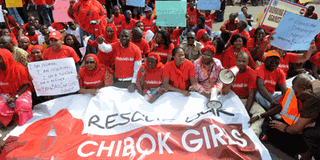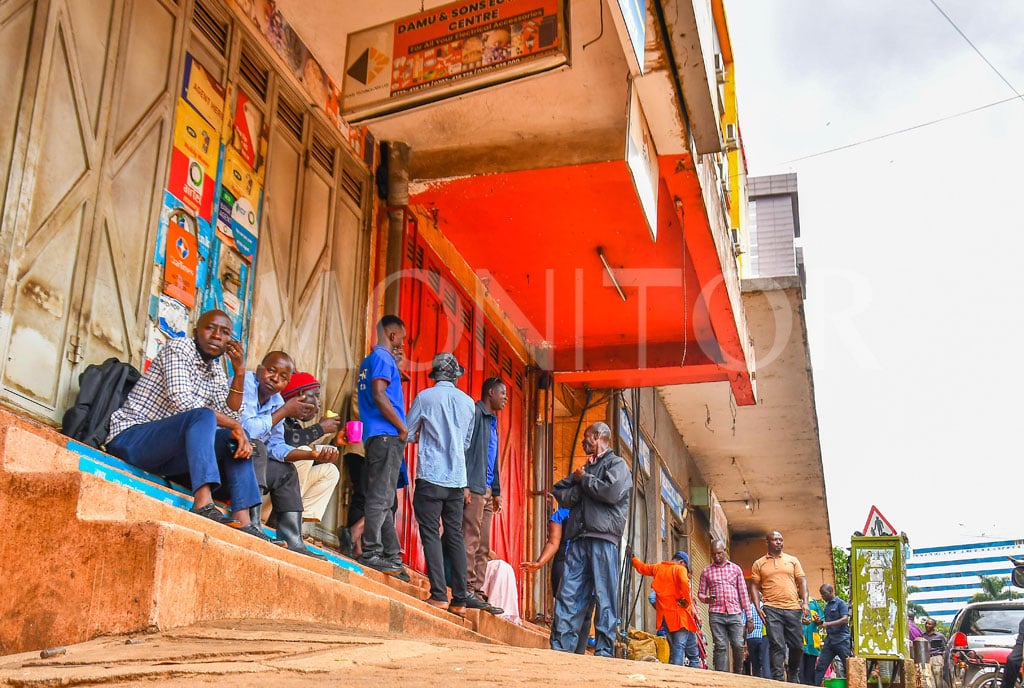#BRINGBACKOURGIRLS: BEHIND THE HASHTAG ARE 230 GIRLS IN CAPTIVITY

What you need to know:
On April 14, more than 200 girls were abducted from a dormitory in Chibok, Nigeria by the militant group, Boko Haram. Almost three weeks later, their ordeal has now grabbed the world’s attention even as the girls’ fate remains unclear.
They went to bed but ended up in abduction. Three weeks ago, on April 14, in the dead of the night, armed men stormed a hostel of an all-girls secondary school in the North East village of Chibok, Borno state in Nigeria. They drove out more than 200 girls, loaded them onto trucks and disappeared with them.
When news of the abduction started making rounds, many features of the occurrence were a subject of speculation. This ranged from the identity of the armed men, the exact number of girls kidnapped and their destination.
Some reports indicated the girls were 276, others234 and others, less than the two. When parents of the missing girls were asked to register the names of their daughters, 230 names were recorded. Currently, that is the certain figure. However, it is also ascertained that 43 girls managed to escape, scaling down the number to 187.
In the aftermath of the incident, Boko Haram, a militant group that has taken responsibility for a wave of terror attacks in north-east Nigeria, was fingered to be liable for the kidnapping of the Nigerian girls. No communication from the group came forth to clear the air. Last Monday, Abubakar Shekau, Boko Haram’s leader, confirmed in a video recording received by AFP, a French news agency, that the group was behind the abductions. “I abducted your girls. I will sell them in the market, by Allah,” he remarked.
While two of the above aspects have been established, one is not; the whereabouts of the girls. The BBC a while ago quoted a resident of Gwoza in the north-east of the country to have seen a convoy of 11 vehicles painted in military colours carrying many girls. The convoy disappeared in the dense Sambisa forest at the border with Cameroon. CNN reported that frustrated Chibok residents combed the forest, on motorbikes, for their missing girls. For nine hours their search was in vain.
Efforts to get the girls back
Protests broke out in the country and other cities around the world in response to the perceived lackluster reaction of the Nigerian government towards the need to rescue the girls. Last week, a number of angry citizens, dressed in red marched to the National Assembly in the capital, Abuja, to hand over a letter of complaint that the government was not doing enough to secure the release of the girls.
Demonstrations about the same were also held in London, Los Angeles, Washington DC and Rome, among other cities.
Public uproar to attract the international community’s attention to help track down and rescue the girls has also been taken to social media. A Facebook page named BRING BACK OUR GIRLS was created as a platform to drum up rallies in the different corners of the world to drag the Nigerian government into “serious” action. The page has so far garnered 54, 900 likes. The same effort has been undertaken on Twitter where the #BringBackOurGirls hash tag has been widely used to condemn the abhorrent action of Boko Haram. Global figures such as Hilary Clinton, pop stars like US Singer Mary J Blige and UK’s Jessie J spearheaded the call on twitter, for the setting free of the girls.
Secretary of State, John Kerry, told the New York Times that the US was also concerned about the situation of the missing schoolgirls.
On the other hand, the Nigerian government stated that it was committed to the search. Earlier, the country’s Interior Minister told the BBC that the government could not divulge the details of its effort to rescue the girls because the militants had threatened to kill them “if certain steps” were taken.
However, when the pressure mounted, President Goodluck Jonathan addressed the nation, where he said; “We believe that wherever these girls are, we’ll get them back.”
Who are the Boko Haram?
Boko Haram is a terrorist organisation that claims links to al-Qaeda. Its name, in the local Hausa language, means “Western education is forbidden”. The group views public schools as places where students are brainwashed by a “Western” curriculum. The group was founded in 2003 by Mohammed Yusuf. It became popular in 2009 after the arrest and killing of Yusuf while in custody. After his death, Shekau took over the outfit’s leadership. He then embarked on violent campaigns targeting Christian villages, police stations and federal institutions in northeast Nigeria.
Last year, as part of their campaign against Western education, the terror group murdered more than 40 university students as they slept at an agricultural college in Yobe, northeastern Nigeria.
Astonishingly, the latest news about the works of Boko Haram are that eleven more girls were abducted on Tuesday, by suspected members of the group. This took place in an unnamed village near one of their strongholds in northeast Nigeria. It was reported that the girls were taken away on trucks along with looted livestock and food.
Media criticised
The international media has also been on the receiving end of the stick for its minimal coverage of the story. Reputable media agencies like the BBC, CNN, New York Times and The Guardian, among others, have been criticised for gaining interest in the missing girls’ story, about two weeks, after the incident.
The critics contrast this to how the media covered the missing people in the mysterious Malaysia Airlines Flight MH370 and the hunt for the survivors of the South Korean ferry accident but did not do the same about the girls of Chibok.
Andrew Mitchel, an ex – Minister in the UK government is one of the notable personalities that were taken aback by the scanty media coverage. He said the children were the future of Nigeria and the kidnapping was an assault of global values. Social and political analysts baffled by the media blackout have labelled the situation as testament of the diverse range of discrimination against girls globally.
Others, like Frida Ghitis, a world affairs columnist for World Politics Review, have stated that whereas the story may have sounded remote, it is a version of the same conflict that drives the fighting in other parts of the world.
For now, the families of these girls hold on to the hope that Boko Haram will hear the now global call to bring back our girls.
Reminiscent of Aboke girls
In Uganda, the incident is reminiscent of the Aboke girls’ story. On the morning, on October 10, 1996 the Lord’s Resistance Army (LRA) rebels attacked St Mary’s College Secondary School Aboke (located in Lira Municipality) and abducted more than 150 girls. Negotiations were later undertaken with the rebels, yielding the release of 109 of the girls. Thirty girls were retained to be taken “for” the LRA leader Joseph Kony. Over the years, 25 of these girls have returned, four were confirmed dead and one is still missing.
Thirty two-year-old Victoria Nyanjura was one of the 25 returnees. Asked about the rationale of Boko Haram’s recent actions she responds, empirically: “To attract the world’s attention about the existence and the activities of the rebel outfit, is the first reason. Girls are precious to almost all communities world over. Anyone who puts them in harm’s way becomes a source of concern and is thus noticed.”
The Aboke girls’ abduction created international recognition for LRA, she recalls Joseph Kony remarking so. “He acknowledged it as one of the goals of the abduction. So, I think it is not any different with Boko Haram,” she says.
Nyanjura notes that the other reason is for the girls to serve as wives for the rebel leaders. Unlike their elderly counterparts, it is believed young girls are able bodied to play the spousal role under the strain of life in the rebel camps, she states. Amongst the LRA there was also an assumption that young girls are HIV free.
Jackson Atwi is the chairman of Concerned Parents Association, which was formed by the parents of the abducted girls. Atwi applauds the effort, on social media, calling for the release of the Chibok girls. “When our daughters were abducted, we also felt the government was not doing enough to rescue them from captivity,” he offers. “We embarked on vigorous campaigns, locally and internationally, to inform the world about the occurrence at St Mary College.” Letters and representatives were sent to different international bodies and renowned world leaders including the Pope. These condemned the actions of LRA and piled pressure on the government to act. It eventually did.
“The rebels are aware that at some point they will return to society. This coerces them to respond to the world’s livid calls. The world should not cease to campaign for the return of these girls until they are back,” he recommends.
Prayer is paramount and the parents should never ever lose hope, he further states. They should not listen to the little voice that may suggest they forget about their return, he stresses.




